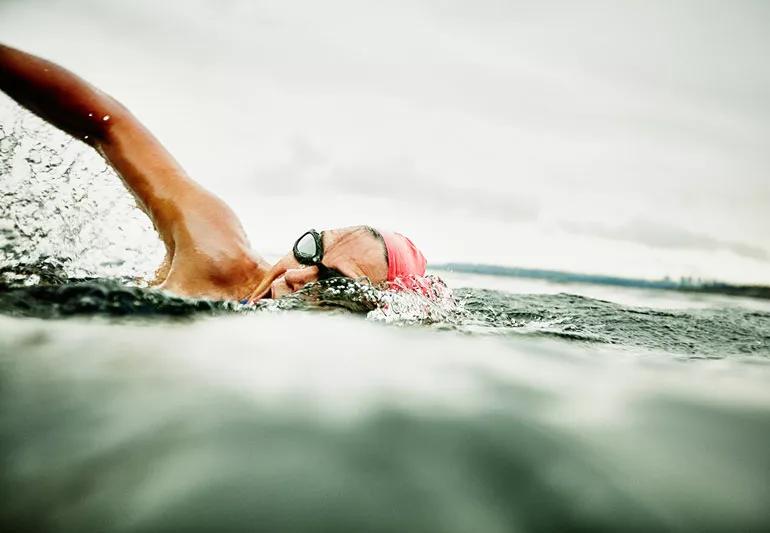How to protect yourself

Image content: This image is available to view online.
View image online (https://assets.clevelandclinic.org/transform/fd2c00e2-1238-414f-a3fd-48d22d79f844/swimmerLakeWellnessTips-673220505-770x533-1_jpg)
A person swimming in a lake.
Do you think your eyes turn red after swimming because of irritating chlorine? Wrong. Experts say it’s actually urine and sweat that are the culprits. They bind to chlorine and create chemical irritants.
Advertisement
Cleveland Clinic is a non-profit academic medical center. Advertising on our site helps support our mission. We do not endorse non-Cleveland Clinic products or services. Policy
This chemical concoction can burn your eyes, or at an indoor pool, irritate your lungs and make you cough. While it’s unpleasant, the fact is that the chlorine is doing its job, fighting off bacterial growth.
When bacteria goes unchecked, whether in swimming pools, water parks or lakes, it can cause recreational water illnesses like diarrhea and skin infections.
Despite these risks, the benefits of swimming tip the scale. Swimming is a supremely good form of exercise and fun. It offers a cardiovascular workout without putting stress on people’s joints, and it offers a way to relax in warmer weather. It also makes kids good and tired at the end of the day.
By taking a few simple precautions, you can continue to enjoy the benefits of pools, water parks and lakes. Here are three ways to lower your chances of getting sick.
“The most important thing is to avoid swallowing water,” says infectious disease specialist Susan Rehm, MD.
It’s important to remember that chlorine does not kill all germs instantly. There’s always a chance you’re swimming in contaminated water. Swimming pools, water parks and hot tubs all pose risk. Swallowing just a little bit of contaminated water can make you sick.
You’ve heard it before. But do many of us really rinse off in the shower before (and after) entering the public pool?
Advertisement
Researchers with the Centers for Disease Control and Prevention (CDC) say diarrhea is the most common recreational water illness, but the list includes skin, ear, and wound infections. Each of us carries .14 grams of fecal material into a pool, according to a 2013 report.
That’s why it’s important to shower before and after swimming.
“Shower and clean off afterwards,” says Dr. Rehm. “Pay careful attention to hand-washing because any bacteria on your hands can end up being swallowed if you touch your mouth or food.”
She also suggests taking bathroom breaks every 60 minutes and taking children on bathroom breaks every half-hour to check their pants or diapers.
Many people don’t pay enough attention to the weather and how it affects bacteria levels in lakes, rivers and streams. Be careful on really hot days and after heavy rainfall, which both cause bacteria counts to rise.
Keep in mind that with knowledge and by taking a few simple precautions, you can safely enjoy all the benefits of swimming.
Advertisement

Sign up for our Health Essentials emails for expert guidance on nutrition, fitness, sleep, skin care and more.
Learn more about our editorial process.
Advertisement
A lower-impact way to keep your heart strong and your mind sharp — and it’s so relaxing!
Despite unhealthy side effects, 40% of adult Americans still pee in pools
Experts share pool safety tips as the contagious delta variant surges
Prevent irritation, illness and more by using pool chemicals the right way
Plus how pools, lakes and sprinklers affect your eyes
Most recommended precautions center around minimizing bruising or swelling
Even one drink can have an impact on your cognitive function leading to slurred speech, blurred vision and impaired memory
Type 2 diabetes isn’t inevitable with these dietary changes
Applying a hot or cold compress can help with pain
Pump up your iron intake with foods like tuna, tofu and turkey